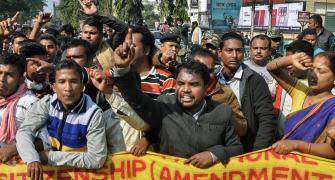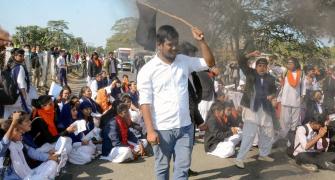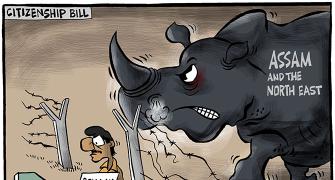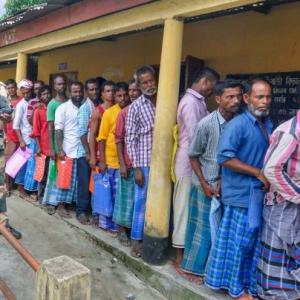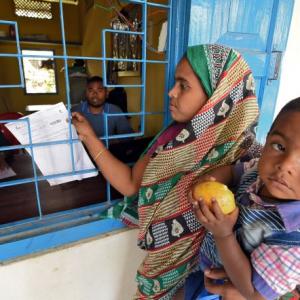'To treat a Hindu fleeing persecution and certain death in Pakistan, Bangladesh or Afghanistan on par with a Muslim voluntarily sneaking into India for economic reasons or otherwise is callously cruel, blatantly perverse and grossly unjust.
'The concept of equality cannot be invoked to perpetuate a historical wrong that needs to be righted,' argues Vivek Gumaste.
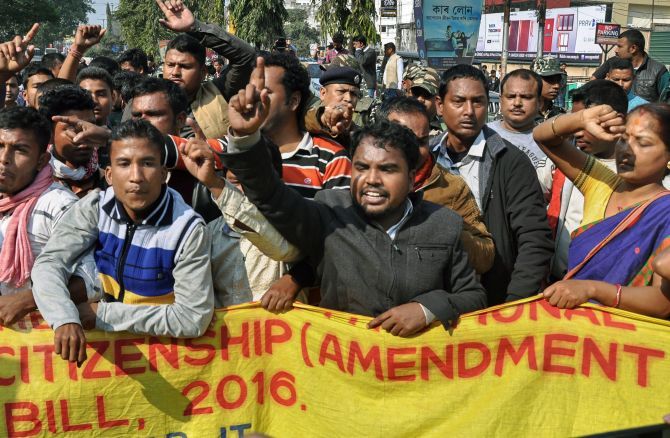
The provocative characterisation of the Citizenship Amendment Bill as an evil diktat that violates the fundamental tenet of equality is nothing more than a well-crafted and deceptive political smokescreen, a blatant attempt at obfuscation that seeks to delude the public into believing that this government is indulging in Constitutional heresy.
Nothing can be more opaque than this clouded assertion.
In fact, the myriad arguments railed against the bill, when clinically analysed, prove to be mediocre, logically untenable, historically challenged and morally suspect.
The Citizenship Amendment Bill passed by the Lok Sabha on January 10 and which seeks to provide citizenship to illegal migrants from Afghanistan, Bangladesh and Pakistan, who are of Hindu, Sikh, Buddhist, Jain, Parsi or Christian extraction, is a long overdue redress of a historical wrong inflicted on a hapless section of a population of undivided india.
The division of the subcontinent in 1947 into a secular India and Islamic Pakistan resulted in an abrupt and catastrophic redefinition of the equation between the individual and the State.
Muslims living in India were given equal status on par with the Hindu majority. Muslims on the other side of the border in Pakistan were given pride of place.
The only disadvantaged sections were the Hindus, Sikhs and Christians left behind in the new Islamic Pakistan; they were literally reduced to second class citizens for no fault of theirs.
Families who had lived for centuries in the same place were disenfranchised by a single stroke of a pen.
The modern Indian nation as the successor State of an ancient civilisation had a bounden duty towards this subset of the population which it abrogated by callously abandoning over 5 million Hindus, Sikhs and Christians and Buddhists to the vagaries of an oppressive religious State. It was an inexcusable moral lapse and a stark dereliction of duty.
Post-Partition, Hindus, Sikhs and Christians were subject to unheard of atrocities in Pakistan: Forced conversions, forced abduction of young girls to be married off to Muslims and forced migration making their lives a veritable hell.
The Hindu population of West Pakistan dropped to 1.6% (23% in 1947). The same was the case with Bangladesh with a decrease to 10% from 29%. In contrast the Muslim population In India grew to 14.2% from 10%.
Victimisation of non-Muslims, especially Hindus, reached a peak during the 1971 War garnering international attention. In a report submitted to the US senate judiciary committee (November 1, 1971) Senator Edward M Kennedy stated: 'Hardest hit have been members of the Hindu community who have been robbed of their lands and shops, systematically slaughtered, and in some places, painted with yellow patches marked 'H'.'
An article in Time magazine, 'Pakistan: The Ravaging of Golden Bengal', categorically concluded: 'The Hindus, who account for three-fourths of the refugees and a majority of the dead, have borne the brunt of the Muslim military hatred.'
Gary Bass in his book The Blood Telegram writes: 'Such anti-Hindu sentiments were lingering and widespread, Blood wrote (Archer Blood was then the American consul general in Dacca).'
'He and his staff tenaciously kept up their reporting of anti-Hindu atrocities, telling how the Pakistan army would move into a village, ask where the Hindus lived, and then kill the Hindu men.'
'Blood and his men emphasised the 'international moral obligations to condemn genocide' of Pakistani Hindus.'
Unofficial estimates indicate that of the 3 million people killed in the Bangladesh genocide, 2.4 million were Hindus.
Historical perspectives like this cannot be ignored when critiquing the Citizenship Amendment Bill.
The contention by an editorial in the Hindustan Times of February 3, 2018, that this bill is 'Constitutionally suspect' and smacks of religious discrimination, is a half-truth; a distorted interpretation of the Constitution with the ulterior motive of demonisation.
True, Article 14 of the Constitution of India states that 'The State shall not deny to any person equality before the law or the equal protection of the laws within the territory of India' and Article 15 disbars discrimination on the grounds of religion, race, caste, sex or place of birth or any of them.
However, over the years the Supreme Court in its judgments has refined the definition of equality. It permits laws to differentiate between groups of people if the rationale for doing so serves a reasonable purpose.
In its judgment (external link) in the Onkar Lal Bajaj vs the Union of India case, the Supreme Court categorically stated that 'equal treatment of unequals is nothing but inequality.'
Therefore, to treat a Hindu fleeing persecution and certain death in Pakistan, Bangladesh or Afghanistan on par with a Muslim voluntarily sneaking into India for economic reasons or otherwise is callously cruel, blatantly perverse and grossly unjust.
The concept of equality cannot be invoked to perpetuate a historical wrong that needs to be righted.
Coming to the apprehensions of people in the north east, especially Assam, the concerns are genuine and justified. However, their ire is misdirected.
Massive illegal immigration of mostly Muslim (not Hindu) Bangladeshis over the last 70 years (and even earlier) has resulted in a dangerous demographic alteration in the region and is the real threat to their indigenous identity.
This issue has been examined and reported on by the Committee for Protection of Land Rights of the Indigenous People of Assam headed by former CEC Hari Shankar Brahma.
The report (external link) handed to the government of Assam in 2018 states: 'The Committee has no hesitation to say that the threats to the land rights of the indigenous people of Assam are real...'
'But by far the most serious threats to the security of the land rights and the very identity of the indigenous people of Assam has come from the sustained immigration of Bengali Muslim peasants in to mainland Assam from the neighboring districts of pre-independent Assam/erstwhile East Pakistan and now Bangladesh.'
Demographic statistics lend credibility to this conclusion. Assam boasts of a much higher growth percentage than India or Bangladesh and has registered an astronomical 77.42% rise in the Muslim population for the period 1971 to 1991.
Per the 2011 census 9 of 27 districts in Assam have become Muslim majority with a couple more becoming so over the next few years.
The National Register of Citizens has identified 40 lakh illegals in Assam, mostly Muslim; practical and sensible estimates put Hindu numbers at negligible levels. In fact, the MHA indicates that only a few hundred will immediately benefit from this bill.
By protesting a non-issue, Assamese are in danger of shooting themselves in the foot by distracting attention from the far more serious problem of illegal Bangladeshi Muslim immigration that threatens their identity.
In conclusion, this Citizenship Amendment Bill is morally valid and long overdue, historically warranted and Constitutionally robust: an act that emboldens the 'idea of India' as an ethical and compassionate nation.
To do otherwise would be a moral apocalypse and an unforgivable deed.
Speaking at a rally in Assam on February 9, Prime Minister Narendra Damodardas Modi could not have expressed this sentiment better: 'They have come to our country and embraced the idea and ethos of Mother India.'
Can we turn them away with a clear conscience?
Vivek Gumaste -- US-based academic and political commentator -- is the author of My India: Musings of a Patriot.

